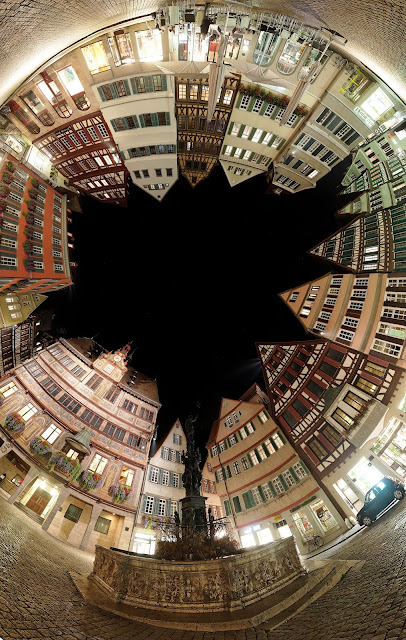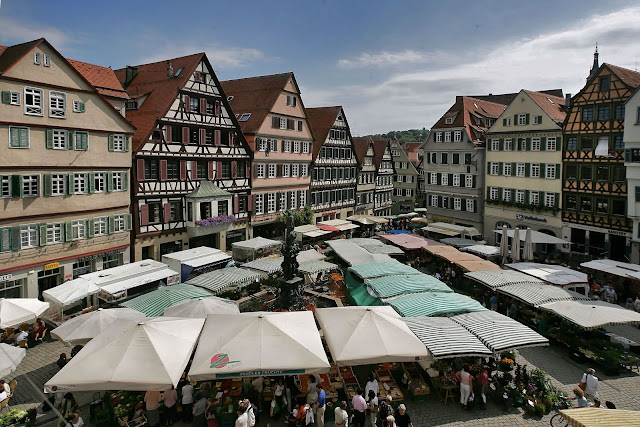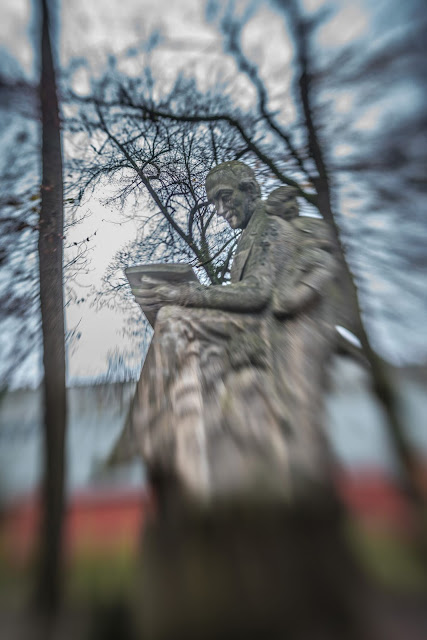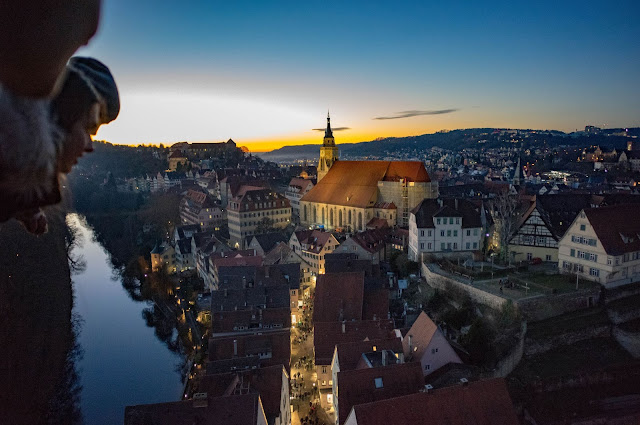PHOTOGRAPH OF KEITH ARMSTRONG IN THE COLLEGIUM, TüBINGEN BY ULRICH METZ, NOVEMBER 1987
'Thanks for a very classy mix of photos and poems.' (Professor Christopher Harvie, University of Tübingen)
I’m flying back
into Tübingen airspace.
I’m ready for Swabian girls of lace.
That’s what makes my pulse race:
the ancient tales of flights of fancy,
the brains of grace,
the gruesome face of an ugly race,
hideous bands under my wheels.
My glowing undercarriage
simply lances
through
all the tempestuous skies
to greet my ascending loves,
the dashing ways,
and blades
of ancient grass,
with blossoming songs
skirting the hurtling runways;
bang of memory,
death of lovely moments
on the tip of my very tongue.
(FROM 'FLYING INTO TÜBINGEN' AIRSPACE)
Oh, how soon
Beauty and form disappear.
You shine with your cheeks
Just like milk and purple shine.
Alas, the roses are withering.
(Wilhelm Hauff)
An ageing, independent scholar disturbed my musings - a dessicated, lonely and embittered bachelor known as ‘skullhead’. For years he has been living all alone. He injected his bitter mockery into the elegy I had just begun and walked around those paths with me for a whole hour, talking and grumbling. It was a strange thing to watch: he couldn't help making bitter and angry jokes, yet he needed so badly to talk about himself and be sociable that he thrust himself upon me in a manner I found almost moving.
(Hermann Hesse, letter from Tübingen 2/10/1898)
I clocked him
again
yesterday,
a long and lonely Sunday,
falling out of the Boulanger
with the moon in his top pocket.
He’d had a schnapps too many
and it showed
on his slobbering tongue.
He was hanging round
nooks and crannies,
last year’s stubble
stuck
on his crazed cranium.
He could have been Hermann Hesse
but he found himself
in a rut,
got his heart broke too often
got his bones frozen
too many times,
embittered,
brittle as old crumbs.
Skullhead knew different,
he knew that the Neckar
was full of piss,
that the trees on the Platanenallee
had brains
and feelings,
that the sky screamed
and churches were awash
with shit.
(FROM 'SKULLHEAD')
 (in memory of Ottilie Wildermuth, 1817-1877)
(in memory of Ottilie Wildermuth, 1817-1877)
In the ‘Seufzerwäldchen’ (Small Forest of Sighs), at the end of the avenue, is the memorial for the writer Ottilie Wildermuth, the only memorial in Tübingen dedicated to a woman.
'Even if thunder rolls,
lightning quivers,
may my little child
fall quietly asleep......
May the little bell sound for me
a quiet peal of funeral bells
when I lay to rest
my brief happiness.'
Under the tree,
the birds bathe in dust.
Under the tree,
Otto is breathing.
Under the tree,
the bells in the sun.
Under the tree,
her eyes flash at me.
Under the tree,
blackbird’s throbbing.
Under the tree,
love life.
Under the tree,
this poem.
Under the tree,
I can sigh.
Under the tree,
sense the pity.
Under the tree,
touch this city.
(FROM 'UNDER THE TREE: A LULLABY IN STORMY TIMES')
This town
casts a glow
in me,
throws me lifelines
to write with,
fishing for ideas
in the sweeping river:
boats
of finished pamphlets
nodding at me
in the sunshine.
I love the light
in Tübingen
streaming down Marktgasse,
flooding in my beautiful blue eyes.
(FROM 'I LOVE THE LIGHT IN TÜBINGEN')
Look down from the Rathaus
and you will see me plodding
over cobbled tales.
I traipse though the clear night,
eyes stumbling across discarded dreams,
toes aching with raindrops.
My eyes sore with forgetting,
the old square undulates with the rhythm
of catcalls and pigeons
pecking at old folks’ bones.
We are but Swabia’s leaves,
blowing about in a hushed city
that baffles our loves,
scattered
on the flow of the Neckar’s infernal gurgle.
I will sing again in Tübingen.
I will kick out the glass on Melancholy Street.
I want to hear Uhland breathe in the daft breeze,
see Hölderlin brood on a raft.
This world is crazy
and my mind
rejoices in it.
(FROM 'TÜBINGEN WEBCAM')
THE FLAIR OF CENTURIES
As an owl flits across
Herrenbergerstrasse roofs,
we all must know
of the shadows of
many lost hopes and careers.
There is no plaque to commemorate
the victims
of all those great and intellectual battles.
Their talents have leaked away
in the midst of a lifetime’s pleasures,
in this market place
of all the Swabian Muses.
O the Ammer and the Neckar
ripple with fallen petals
and you can hear the strains
of the Rauberlied
drifting towards you
along rivers of song.
It’s a riot for bread and grain,
even the Professors get paid in crumbs,
above the heads of their hungry students.
And all the old comedians
chortle in their granaries,
as Camerarius discovers the sex of plants
and our Fuchs christens a flower.
Walk the Platanenallee and listen
to Silcher’s tunes in the trees.
Trace Hauff’s tales in the wood
and Uhland’s poems on the water.
It is the flair of centuries
of intellectual uplifting:
it is the scent of Tübingen’s fuchsias
bursting open
your heart.
(Poet Ludwig Uhland)
WOODEN HEART: A NEW SONG IN THE MORNING FOR PHILIPP FRIEDRICH SILCHER (1789-1860)*
Through an arch of towering plane trees,
I reach to touch the hips
of an upright Swabian girl,
her lips
fresh with strawberries
from a breakfast bowl of kisses
sprinkled with sugar
and yesterday’s cream.
The birds of the Platanenallee
fly on the wings of melancholy,
the breeze of history
scenting their songs.
It dawns on me
that the rain
will lash against our faces
as we push our way
through the saluting wood.
The day is crumbling already
around us
with the leaves memorably
crunching under our futile tread.
Half way along the soaking avenue,
the sun like a song
sparkles in my eyes
and lights my last hours
with the beauty of skies.
And suddenly
you are there
your lump of a statue
bursting though the leaves,
a kind of terrible stone
trapping your crumbling tunes
inside rock.
To take a frail life
and carve it into something immortal
is a folly as well as a tribute
to the hypocrisy of pompous little leaders
seeking to employ music
for their brutal ends.
So I say
and so we sing
of beautiful glances
and military funerals
of dead songbirds
in the path of bullets.
I climb in spirit
to reach the flesh of this lovely girl,
for a moment
I am happy and then it is gone
behind the clouds of war.
And this is for you Friedrich
from my fluttering heart
in a sea of shaking branches,
reaching out
for humanity
to triumph
over the horror
of the mundane,
a gift of a song for you,
a lovely glass of wine
as the armies march again
into the blind alley
of a bleak despair:
Can't you see
I love you?
Please don't break my heart in two,
That's not hard to do,
'Cause I don't have a wooden heart.
And if you say goodbye,
Then I know that I would cry,
Maybe I would die,
'Cause I don't have a wooden heart.
There's no strings upon this love of mine,
It was always you from the start.
Treat me nice,
Treat me good,
Treat me like you really should,
'Cause I'm not made of wood,
And I don't have a wooden heart.
Muss i denn, muss i denn
Zum Staedtele hinaus,
Staedtele hinaus,
Und du, mein schat, bleibst hier?
Muss i denn, muss i denn
Zum Staedtele hinaus,
Staedtele hinaus,
Und du, mein schat, bleibst hier?
(Got to go, got to go,
Got to leave this town,
Leave this town
And you, my dear, stay here?).
There’s no strings upon this love of mine,
It was always you from the start,
Sei mir gut,
Sei mir gut,
Sei mir wie du wirklich sollst,
Wie du wirklich sollst,
(Treat me nice,
Treat me good,
Treat me like you really should,
Like you really should),
'Cause I don't have a wooden heart.
*Swabian musician Philipp Friedrich Silcher originally composed the tune, based on a folk lyric, used in the pop song ‘Wooden Heart’. His statue by Wilhelm Julius Frick (1884-1964), erected in 1941, is in Tübingen by the River Neckar.
THE OLD TÜBINGEN SLAUGHTERHOUSE
What ghosts of Swabian poets
hang here?
What dripping carcasses of words
soak its skin?
Death butchers us all
and turns our pompous dreams
to dried shreds.
Through the dark beams,
the ghosts of Uhland and Moerike
stalk the pigeon-infested morning;
their lyrics breathe
through the dying day.
What dead history?
What living sleepwalks
creak the bloody stairs?
The bells toll through the dust
of long-lost traders;
the startled bats shriek though the rafters
and swifts rush
across the plains of ancient graves.
Hoelderlin is howling still:
the pain of his madness
cuts memories into the wood.
My heart is teeeming with the Neckar,
swarming with the blood of others.
Cut me up.
Slash at my poet’s veins,
my crooked hat hides my fading eyes.
My soul is walking through the Seminary,
taking a pils in Hades
searching for my old friend Horst.
As I sing poetry to old priests,
boats slide along the river,
full of slaughtered tunes.
The lonely choir in the Market Place
speaks of old men rotted on battlefields,
speaks of young men who never learn
and the girls who fall for them.
LANGE GASSE 18
The leaves blow through the glass
as dreams float in the room
and people I have travelled with
climb up these timbered stairs.
Memories coat the walls,
days wander down the lane;
there is no telling where the tales
of drunken nights have gone.
Church bells punctuate the moon,
screams open up the dawn,
and I see Jennifer lying there,
poems oozing from her smiles.
At morning, Ingrid, with her little hands,
brings coffee to my brain
and Karin calls at evening’s door
with wine to ease the pain.
All these dancing moments,
the dripping down of hours;
this house’s chest is heaving
with the loss of human touch.
I drink those sunken days
and know the gulps are fleeting
but the moonlight-stains on the empty bed
will show we bled
for love.
She pampers my mind
with fresh ideas,
and comes to me
down Lange Gasse
in her boots
and stockings
from another century.
This life is limitless.
We must explore
the dirty lanes
behind Town Halls,
the ray of light
in the graveyard of poets.
This unforgettable hour,
kissing away
life.
(FROM 'A LOVELY GIRL')
ROLL ON HÖLDERLIN (am Neckar)
(for Jochen)
To the Very Honourable Poet Mr Keith Armstrong
'I wish you good luck for all the seasons in your life and always a high inspiration for your poems.'
(Jochen from the Hölderlin Tower)
Hölderlin
holds his own,
holds his own
in this sex-crazed country.
Hölderlin
rolls his own,
rolls his own
in this burnt-out company.
Hölderlin
rolling on,
holding on
in this fearful Germany.
The motor stalls,
the government falls -
it‘s Hölderlin
knocking down walls:
Hölderlin
knocking down walls.

 LANGE GASSE 18
LANGE GASSE 18

































































